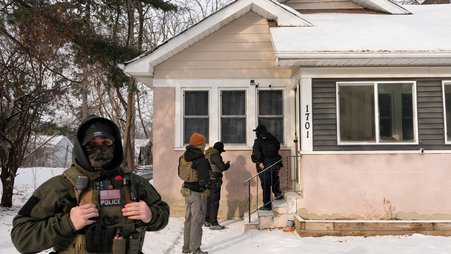Dear Friend of Press Freedom,
It’s now been over 100 days since journalist Mario Guevara has been imprisoned for covering a protest, and Rümeysa Öztürk has faced deportation for nearly 200 days over an op-ed the government didn’t like. Read on for why cases like these deserve as much outrage as the Federal Communications Commission’s latest attempt at silencing free speech.
Journalist facing deportation deserves same energy as Kimmel
When ABC suspended Jimmy Kimmel Live! last week following a shakedown from the Trump administration, celebrities, free speech advocates, and ordinary Americans voiced their outrage. They were right to sound the alarm — and it (mostly) worked. Kimmel’s back on the air.
But where is that same outrage against the government’s effort to deport Mario Guevara, an Atlanta-area journalist who has lawfully resided in the U.S. for 20-plus years? His only “offense” is informing the public of protests against the government, but he faces imminent deportation.
Speaking of Kimmel, our advocacy director, Seth Stern, went on the “Legal AF” podcast on the MeidasTouch network to talk about our supplement to our July attorney disciplinary complaint against FCC Chair Brendan Carr. Read more about Guevara’s case here.
How noncitizen journalists can prepare for ICE
The immediate priority is getting Guevara’s case dropped, but we also don’t want there to be any more baseless deportation cases against journalists. Many newsrooms — not to mention freelancers — have little experience dealing with immigration authorities, though. Luckily, we know people who do.
We hosted a panel discussion featuring immigration lawyers, civil rights advocates, and journalists to talk about what to do when a journalist is detained by Immigration and Customs Enforcement — and what must happen before that day ever comes. Read about it and watch it here.
Pentagon seeks to control the press
The Pentagon faced bipartisan backlash for its ridiculous policy requiring journalists to agree not to obtain or report “unauthorized” information. We called them out in The New York Times, CNN, The Intercept, and elsewhere. Stern also discussed the disturbing move on NPR’s Los Angeles affiliate, KCRW, and FPF’s Lauren Harper discussed this and other threats to press freedom on NPR’s 1A.
First, President Donald Trump tried to downplay the policy. Now, in a letter responding to an inquiry from the Reporters Committee for Freedom of the Press, officials are trying to walk it back. Unfortunately, the response offers little reassurance that the Pentagon’s intentions are anything but censorial, and doubles down on restricting routine constitutionally protected newsgathering. Read more here.
Drop charges against Cincinnati journalists
Jury trials of journalists arrested while reporting news are exceedingly rare in the United States, but the next two are coming next week unless prosecutors come to their senses.
Journalists Madeline Fening and Lucas Griffith, both of whom were arrested while covering a protest on July 17 for Cincinnati-based CityBeat, are set to be tried Sept. 30 and Oct. 2, respectively. In an unfortunate irony, the protest was in opposition to the recently dropped immigration case against Ayman Soliman, who himself fled Egypt to escape persecution for his journalism. We led a letter to prosecutors from rights organizations and local journalism professors urging them to drop the baseless charges. Read more here.
Proposed ‘safety’ bill would undermine accountability for lawmakers
FPF’s Caitlin Vogus writes for The Minnesota Star Tribune that a bill sponsored by Sens. Amy Klobuchar and Ted Cruz to protect lawmakers won’t fully stop data brokers from trafficking their personal information but will stop journalists and watchdogs from holding them accountable.
Use our action center tool to tell Congress to reject this bill.
Police records must stay public in California
A searchable public database known as the Police Records Access Project has made public for the first time more than 1.5 million pages of previously secret records about the use of force and misconduct by California police officers.
The California legislature, however, is trying to put police misconduct back under wraps. This month, it passed AB 1178, a new bill that would make it harder for the public to access these records. The bill is awaiting Gov. Gavin Newsom’s signature or veto. Read more here.
What we’re reading
Urgent ideas for defending press freedom in Gaza (Columbia Journalism School). Columbia followed up on last month’s important article in Columbia Journalism Review with a discussion about finding creative ways to help journalists in Gaza despite anti-press regimes both here and in Israel. FPF Executive Director Trevor Timm and board member and Pulitzer Prize-winning journalist Azmat Khan were both on the panel.
Israel killed 31 journalists in Yemen strike, press freedom group says (The Washington Post). It’s not just Gaza. The Committee to Protect Journalists says the strike in Yemen was “the deadliest strike on journalists in the Middle East” it has documented to date.
Letter from ICE detention facility (The Bitter Southerner). Guevara recounts the harrowing details of his detention in an Atlanta federal prison. You can also read his son’s plea for his release.
Investors rejoice over looming TikTok deal despite political concerns (Al Jazeera). Days after Trump said frequent criticism of his administration should be illegal, he is finalizing plans to steer control of TikTok to his billionaire friends. “It would be naive to think they won’t censor Trump’s critics while boosting content that pleases him,” Stern said.
It’s 2025. Do you know how secure your newsroom is? (Neiman Lab). “What’s really important is that sources know where to reach you in a way that helps them stay secure,” FPF’s Davis Erin Anderson said.
Trump signs order labeling antifa ‘domestic terrorist organization’ (The Hill). Trump’s executive orders on domestic terrorism and threats to use racketeering laws against protest movements can and will be used to threaten journalists and sources. Journalists who cover “antifa” or report on ICE must now risk being accused of terrorism.
Judge strikes down Trump’s $15 billion suit against The New York Times (The Washington Post). We’re glad a judge tossed this ridiculous lawsuit, but the attorneys behind it should have been sanctioned.





